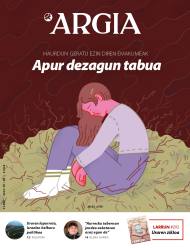Young people, an increasingly reduced vocabulary
“Young people use increasingly reduced vocabulary,” “the youth speak increasingly has more loans,” “young people are less expressive,” “we will soon talk in Spanish thinking that we are talking about Euskera.” I often use this type of assertion in courses organized for teachers. I write on the board and ask the students if they agree, of course most do. Then I tell you: the first one was launched by Konfuzio a. C. 510. The second, Aristotle. 329. The third, Habermas… What I do is a bad plagiarism, because once another teacher did it to us, but I had no phrases, no authors appointed and therefore correct. The last sentence was issued by Lazkao Txiki. The worst thing is, I don't remember or who the professor was and I can't ask for real quotes.
It has always been customary to criticize the language of young people or new generations, believing that “old” was better. In our case, in addition to young people, the newcomers to the language are also very important, as the percentage of Euskaldunes is high. Consequently, more Euskaldunes than ever are more competent in another language. However, the most serious risk is not to “ruin” Euskera, but to give up Euskera.
It has always been customary to criticize the language of young people or new generations, believing that “old” was better
One of the reasons for not using language can be the fear of being wrong. Minority language speakers like ours have an easy getaway, as few criticize for their torpedoes in Spanish, French or English, and have many resources to enrich and adapt language. Because communicative competence is not only acquired in schools, nor in Euskaltegis; it is learned in all areas of life, and lately especially on screens. The hegemonic languages have recorded all kinds of communicative, real or fictitious situations, which allows the speakers to continuously be in direct contact with the language and to work all records. We all receive a huge amount of inputs in Spanish, both in the respiratory areas and in the strictures, with which we are Spanish speakers.
We therefore need audiovisual, cultural, media or real materials. Then, we have to put in front of the spotlights these appropriate and varied oral models and encourage them well so that attractive linguistic forms get through the eyes. That is all we have to do, yes, but above all that habit of criticising languages must end. It's not the time of the Red Boluses, Damn!
Bidali zure iritzi artikuluak iritzia@argia.eus helbide elektronikora
ARGIAk ez du zertan bat etorri artikuluen edukiarekin. Idatzien gehienezko luzera 4.500 karakterekoa da (espazioak barne). Idazkera aldetik gutxieneko zuzentasun bat beharrezkoa da: batetik, ARGIAk ezin du hartu zuzenketa sakona egiteko lanik; bestetik, egitekotan edukia nahi gabe aldatzeko arriskua dago. ARGIAk azaleko zuzenketak edo moldaketak egingo dizkie artikuluei, behar izanez gero.
Like many other friends, in recent years Catalonia has followed closely. What happened there since we were brought forward with the 2017 referendum affects us. That is why I have also been looking forward to the election results.
Thinking of a more interesting and innovative... [+]













